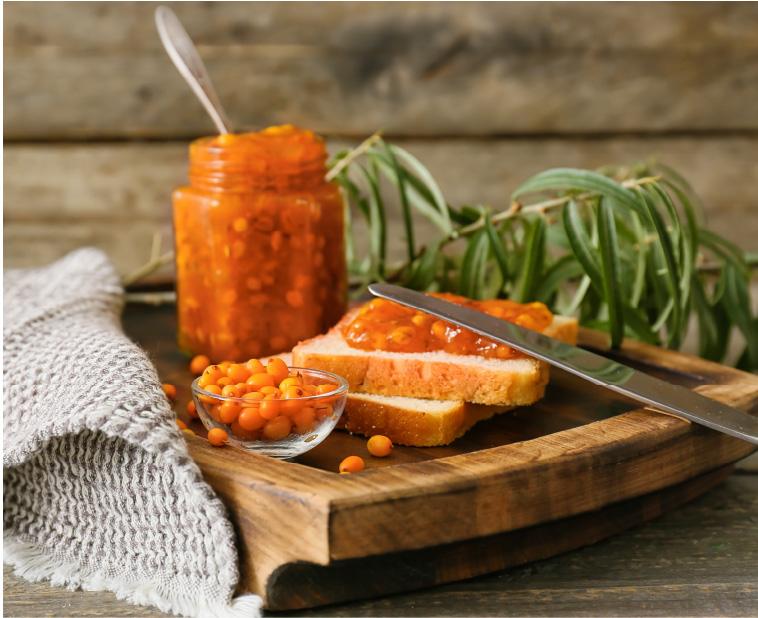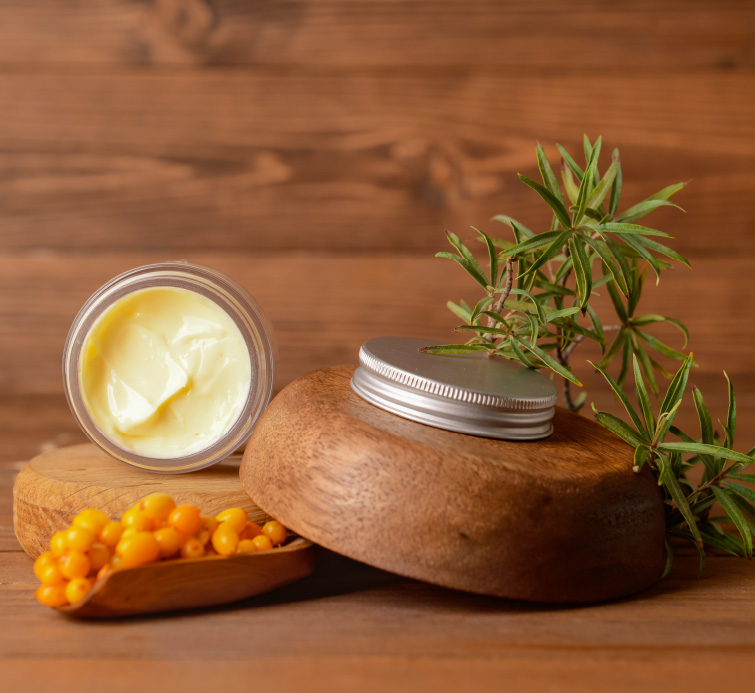Sea Buckthorn Oil
Sea Buckthorn Oil is rich in Omega 7 (Palmitoleic Acid) which is a rare compound that provides Sea Buckthorn Oil with its unique health properties.
Sea Buckthorn Oil - Pharmacological Studies
![]()
![]()
![]()
![]()
Antioxidant Activity
Antioxidant activity of the sea buckthorn has been widely studied in multiple mechanisms of oxidative damage in vitro and animal models. Sea Buckthorn Oil displayed hepatic protection in a carbon chloride induced mice model by improving their antioxidant defense system and suppressing lipid oxidation [25]
Cardiovascular Protection
Various studies have reported the cardioprotective effects related to the health benefits of rich flavonols content and unique fatty acids in Sea Buckthorn Oil. In addition, Xu et al. summarized the cardioprotective effects of sea buckthorn flavonols, which include increasing circulating lipid markers, preventing cardiac cell death from oxidative stress and injury, and improving cardiac cell health. Sea Buckthorn Oil was also investigated for its benefit in cardiovascular health for its high amount of polyunsaturated fatty acids, known for their antiatherogenic, hypocholesterolemic and antiplatelets aggression effects [21].
Mucosa Health & Gastric Ulcers
Evidence in both animal and human clinical studies showed protective effects of Sea Buckthorn Oil on mucosa membrane in gastric ulcer models. Oral administration of supercritical CO2-extracted Sea Buckthorn Oils significantly reduced ulcer formation in rats. In addition, administration of seed and pulp oils significantly reduced the index of pylorus ligation-induced gastric ulcer and sped up the healing process of acetic acid-induced gastric ulcers.[4]
Effect on Vaginal Atrophy
(thinning and drying of vaginal mucosa)
Typical symptoms of vaginal atrophy include vaginal discomfort, feelings of dryness, burning, itching and dyspareunia [1]. A prevalence of 43% for the symptoms of vaginal atrophy among post-menopausal women was recently reported in Finland and United States [3]. Clinical study by Larmo Et al (Finland) suggests that intake of SB oil improves integrity of the vaginal epithelium among postmenopausal women.
![]()
Antioxidant Activity
Antioxidant activity of the sea buckthorn has been widely studied in multiple mechanisms of oxidative damage in vitro and animal models. Sea Buckthorn Oil displayed hepatic protection in a carbon chloride induced mice model by improving their antioxidant defense system and suppressing lipid oxidation [25]
![]()
Cardiovascular Protection
Various studies have reported the cardioprotective effects related to the health benefits of rich flavonols content and unique fatty acids in Sea Buckthorn Oil. In addition, Xu et al. summarized the cardioprotective effects of sea buckthorn flavonols, which include increasing circulating lipid markers, preventing cardiac cell death from oxidative stress and injury, and improving cardiac cell health. Sea Buckthorn Oil was also investigated for its benefit in cardiovascular health for its high amount of polyunsaturated fatty acids, known for their antiatherogenic, hypocholesterolemic and antiplatelets aggression effects [21].
![]()
Mucosa Health & Gastric Ulcers
Evidence in both animal and human clinical studies showed protective effects of Sea Buckthorn Oil on mucosa membrane in gastric ulcer models. Oral administration of supercritical CO2-extracted Sea Buckthorn Oils significantly reduced ulcer formation in rats. In addition, administration of seed and pulp oils significantly reduced the index of pylorus ligation-induced gastric ulcer and sped up the healing process of acetic acid-induced gastric ulcers.[4]
![]()
Effect on Vaginal Atrophy
(thinning and drying of vaginal mucosa)
Typical symptoms of vaginal atrophy include vaginal discomfort, feelings of dryness, burning, itching and dyspareunia [1]. A prevalence of 43% for the symptoms of vaginal atrophy among post-menopausal women was recently reported in Finland and United States [3]. Clinical study by Larmo Et al (Finland) suggests that intake of SB oil improves integrity of the vaginal epithelium among postmenopausal women.

Dietary Use
Sea buckthorn berries or “Seaberry” has been consumed by humans throughout history. Awareness has grown rapidly in the past few decades as a new superfruit for wellness and beauty because of its unique blend of vitamins, essential fatty acids, amino acids and other phytochemicals. Their high ascorbic acid content places the sea buckthorn berry among one of the richest sources of vitamin C. Together with other phytochecmicals, sea buckthorn berries may also contribute to metabolic syndrome management. Sea buckthorn pulp oil standardized to 30 % omega-7 (palmitoleic acid) was reported to help avoid weight gain and maintain a slim physique.
Lehtonen et al. evaluated the benefits of sea buckthorn on metabolic diseases in overweight/obese women by using test material for 33–35 days followed by a 30–39 day wash-out. The authors found that sea buckthorn reduced the subjects’ waist circumference by an average of 1.2 cm suggesting the sea buckthorn consumption may possess slight health benefits related to manage metabolic syndromes [45].
Blood Glucose
In animal studies with sea buckthorn fruit powder and seeds, hypertensive stroke-prone rats showed improvement in their metabolic processes and reduction of hypertensive stress; sucrose-fed rats showed decreases in blood pressure, hyperinsulinemia, and dyslipidemia; dogs with acute heart failure showed strengthened cardiac pump functions; rabbits fed with high cholesterol diets showed reduction in LDL atherogenic index, increase in HDL and vasorelaxant activities.
Sea buckthorn is also found to decrease fasting blood sugar levels, triglycerides, and nitric oxide in diabetic rats [21]; possible processes to achieve this include improving insulin secretion and sensitivity, increasing liver glycogen, and downregulating glyconegoensis [27].
In a randomized crossover study, overweight women consumed sea buckthorn, sea buckthorn oil, and sea buckthorn phenolic fraction for 30 days; the authors found that the use of these sea buckthorn products led to a significant effect on the subjects’ overall metabolic profiles.
Sea buckthorn oil induced a decreasing trend in the serum total cholesterol, intermediate-density lipoprotein (IDL), low-density lipoprotein (LDL) [46].
In another study, 12 healthy normolipidemic men were assigned to take 5 g/day sea buckthorn oil or fractionated coconut nut oil (control) for 4 weeks with a 4–8 week wash-out. The sea buckthorn oil group displayed clear decreases in the rate of adenosine-5′-diphosphate-induced platelet aggregation and maximum aggregation, though phospholipid fatty acids, plasma lipids, and glucose were not affected by the treatment; the data suggested that sea buckthorn may have beneficial effects on blood clotting.


Beauty & Skin
Sea buckthorn oil extract is popularly used in cosmetics, beauty products, creams and lotions for cleaning, detoxifying, rejuvenating, restoring and softening skin. Traditional use of sea buckthorn oil to promote the recuperation of skin injuries and to support the treatment of skin diseases aligns with clinical findings.
In a double blind placebo controlled study, 5 g of sea buckthorn pulp oil administration by 49 atopic dermatitis patients for 4 month significantly improved their dermatitis and increased their HDL levels [37].
Other studies showed significant improvement in skin collagen synthesis, wrinkling, elasticity, surface roughness, luminosity, and cutaneous thickness after oral doses of 2 g of seed oil daily or topical cream for 3 months in females subjects age 50–70 years old [38].
Another 8-week study applied a cream containing 1 % sea buckthorn berry to 21 healthy subjects, results showed increases in skin hydration level and significant decreases in skin transepidermal water loss which indicated anti-wrinkle effects [39];
151 burned patients received the treatment with sea buckthorn oil dressing every other day showed more obvious exudation reduction, pain relief, faster epithelial cell growth, and wound healing compared to the control group which was treated with vaseline gauze [40].
Safety Evaluation and Toxicity
Since sea buckthorn was found to slow blood clotting [43], it is recommended to stop using sea buckthorn at least two weeks before and after surgery.
Sea buckthorn berries have a long history as food. Seed oil, pulp oil, and juice have proven to be relatively safe by toxicological studies in animal models. The investigation includes acute and chronic toxicity in blood, liver-kidney functions, and heart health as well as mutagenicity and teratogenicity of ingested oil [4].
Acute toxicity studies showed that LD50 of a single ig for mice is 20.4 ± 2.6 g/kg juice concentrate; mice displayed reduced heart rates when given 30 g/kg juice concentrate. Mice died 40 days after given sea buckthorn oil at a dose of 15 g/kg via intragastric daily[5].
In several chronic toxicity studies, neither toxic reactions nor visible pathological changes were found when mice were orally administered with a single strength juice at a dose of 520 ml/kg daily for 6 months, or administered 0.3 g/kg daily for 12 months respectively [5].
Sea buckthorn oil was found safe in rabbits when administered intramuscularly at a dose of 1.5 ml/kg daily for 7 weeks [47].
It was also found to be safe at an oral dose of 2.5 ml/kg body weight, and at a dose of 200 μL when applied for 7 days on experimental burn wounds in rats [28].

